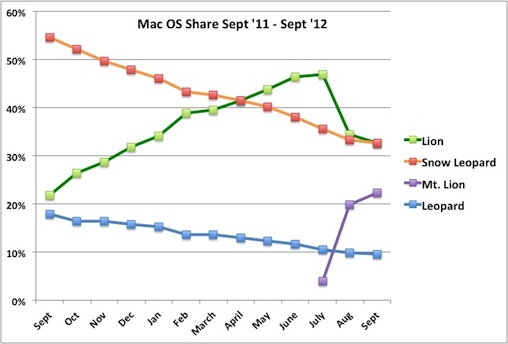More Mac users took to OS X Mountain Lion last month even as its explosive growth in August slowed dramatically, Web measurement company Net Applications said Monday.
The ebbing uptake fit earlier OS X upgrade trajectories.
Mountain Lion, also known as OS X 10.8, accounted for 22.3% of all Mac operating systems during September, Net Applications' data showed. That represented a two-and-a-half point increase over August, when Mountain Lion recorded a massive 16-point jump over the month before.
Apple released Mountain Lion on July 25.
But September's gain was just a little over half what OS X 10.7, also known as Lion, picked up in its second month on the market last year. After two full months in 2009, Lion powered 22% of all Macs, a statistically dead heat with Mountain Lion this year.
Mountain Lion's faster climb its first month could be attributed to Apple's $20 price, a third less than either the Lion or Snow Leopard upgrades.
But the quick start and second-month slowdown of Mountain Lion, and Lion before it, were par for the course: In 2009, OS X 10.6, or Snow Leopard, did the same, ending with a 22.1% share of all Macs after its second month of availability.
As in August, Mountain Lion's growth came mostly at the expense of Lion, which fell by 1.7 percentage points. Snow Leopard, meanwhile, lost seven-tenths of a point; 2007's Leopard dropped just two-tenths of a percentage point.
Nor were those numbers a surprise: Mac owners running the most-current OS X are historically the ones who rush to upgrade, in part because they can -- Mountain Lion, for example, could not be installed on some relatively youthful Macs -- and in part because they're more interested in staying current.
Snow Leopard users can upgrade to Mountain Lion assuming their Macs meet the system requirements.
At a 32.7% share each, Lion and Snow Leopard tied for the top spot last month. The aging Leopard, on the other hand, ended September owning less than 10% of the OS X market.
The small decline of Snow Leopard last month makes Apple's decision to continue patching the operating system look smart. If Apple had decided not to update Snow Leopard, as most security researchers expected, 45% of all Mac owners would now be running an OS with known vulnerabilities.
Net Applications measures operating system usage by tracking unique visitors to approximately 40,000 Web sites. More information about its September stats -- including gains by Microsoft's Windows 7 and erosion of the 11-year-old Windows XP -- can be found on the company's website.

OS X Mountain Lion's share of all Macs climbed to 22% last month, but its uptake pace slowed significantly, as most Apple upgrades do their second month.





